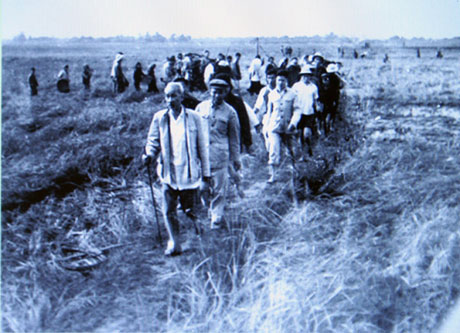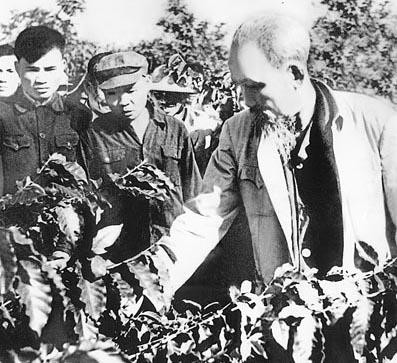Uncle Ho's affection for the peasant class
(Baonghean.vn) - During his lifetime, President Ho Chi Minh always paid attention to all social classes, in which he paid special attention to the peasant class. On the path to happiness and prosperity, Vietnamese farmers always had Uncle Ho with them.
Vietnamese farmers are a great force of the revolution. They did not hesitate to sacrifice, actively increased production, and contributed human and material resources to the sacred resistance of the nation. More than anyone, Uncle Ho understood the hardships and difficulties of those people.
At every meal, Uncle Ho paid attention not to drop a single grain of rice. He considered wasting each grain of rice as wasting the sweat and effort of his compatriots and comrades. In his Will, he proposed “to exempt agricultural tax for one year for agricultural cooperatives to make the people happy, feel at ease, feel more excited, and boost production.”
 |
| Uncle Ho visited members of Thap Thuong Cooperative, Dan Phuong, Hanoi, harvesting crops. Photo courtesy |
When the American war of destruction in the North was fierce, Uncle Ho spent time going down to the cooperatives to visit and encourage farmers. The image of Uncle Ho rolling up his pants to wade in the fields, bailing water, and pedaling the water wheel to prevent flooding with the people are beautiful images in the hearts of the people.
When he heard that the Red River dike in the Hung Yen and Thai Binh areas had broken, Uncle Ho personally went down to inspect the damage recovery. He asked in detail how many people had been injured, and instructed them to first take care of food so that people would not go hungry, then to find a place to live and stabilize their lives, and to concentrate human and material resources to rebuild the broken dike. He promised that when the construction was finished, he would come down to visit.
Keeping his promise, 4 months later, Uncle Ho came down to attend the inauguration of the newly built dike section. He inspected the area where the new dike meets the old dike and reminded them that it needed to be reinforced to ensure safety. He praised the quick construction but the compaction was not yet tight, and needed to increase the force to compact it thoroughly to ensure long-term durability.
 |
| Uncle Ho tested the improved rice transplanter at the Rice Cultivation Experimental Farm of the Hanoi Department of Agriculture and Forestry. Photo courtesy |
In the “Letter to Farmers to Compete in Cultivation” in February 1951, Uncle Ho wrote: “If food is sufficient, the army will be strong! Soldiers at the front compete to kill enemies and gain achievements, then the people in the rear must compete to increase production. Fields are battlefields, hoes and plows are weapons, farmers are soldiers, the rear competes with the front.” The letter showed Uncle Ho’s special concern for the peasant class and agricultural production.
When visiting the people, Uncle Ho did not use general words but was very specific, explaining each matter clearly, pointing out advantages to promote, and pointing out shortcomings to overcome. Standing before the people, Uncle Ho did not read a speech but spoke kindly and asked questions.
In his final years, Uncle Ho still spent a lot of time working with comrades in charge of agriculture. At Politburo meetings or working sessions on agriculture, Uncle Ho often mentioned the Cooperative Charter. He said: Workers have an anniversary, farmers must also have an anniversary, so the date of promulgation of the Cooperative Charter should be the anniversary for farmers. He instructed to write the Charter so that even less educated farmers could understand it. After reading the draft, Uncle Ho said this was for cadres, for cooperative members it should be written more concisely and easier to understand...
 |
| Uncle Ho visited farmers harvesting rice in the fields of Hung Son commune, Dai Tu district, Thai Nguyen. Photo archive |
Before passing away, he left behind a lot of love for his comrades and fellow countrymen. In the supplementary part of his Will written by Uncle Ho in May 1968, he devoted a paragraph to the Vietnamese peasant class. He wrote: “During the years of resistance against French colonialism, then against American imperialism, our people, especially peasants, have always been extremely loyal to our Party and Government, contributing money and people, willingly enduring all difficulties and hardships. Now that we have completely won, I propose to exempt agricultural tax for 1 year for agricultural cooperatives to make our people happy, happy, more excited, and boost production.”
 |
| Uncle Ho visited the coffee hill of Dong Hieu Farm, Nghia Dan district (Nghe An). Photo archive |
Today, our country has become one of the leading rice exporters in the world. The lives of farmers have changed, their children have been educated and have knowledge. In that great joy, we remember our beloved Uncle Ho - the builder of the new Vietnam, the great leader of the Party and the nation, who spent his whole life caring for and being close to the farmers and rural areas of Vietnam. Uncle Ho will live forever in the hearts of the nation, in the hearts of the hardworking, simple and loyal farmers.
Peace
(Synthetic)
| RELATED NEWS |
|---|


